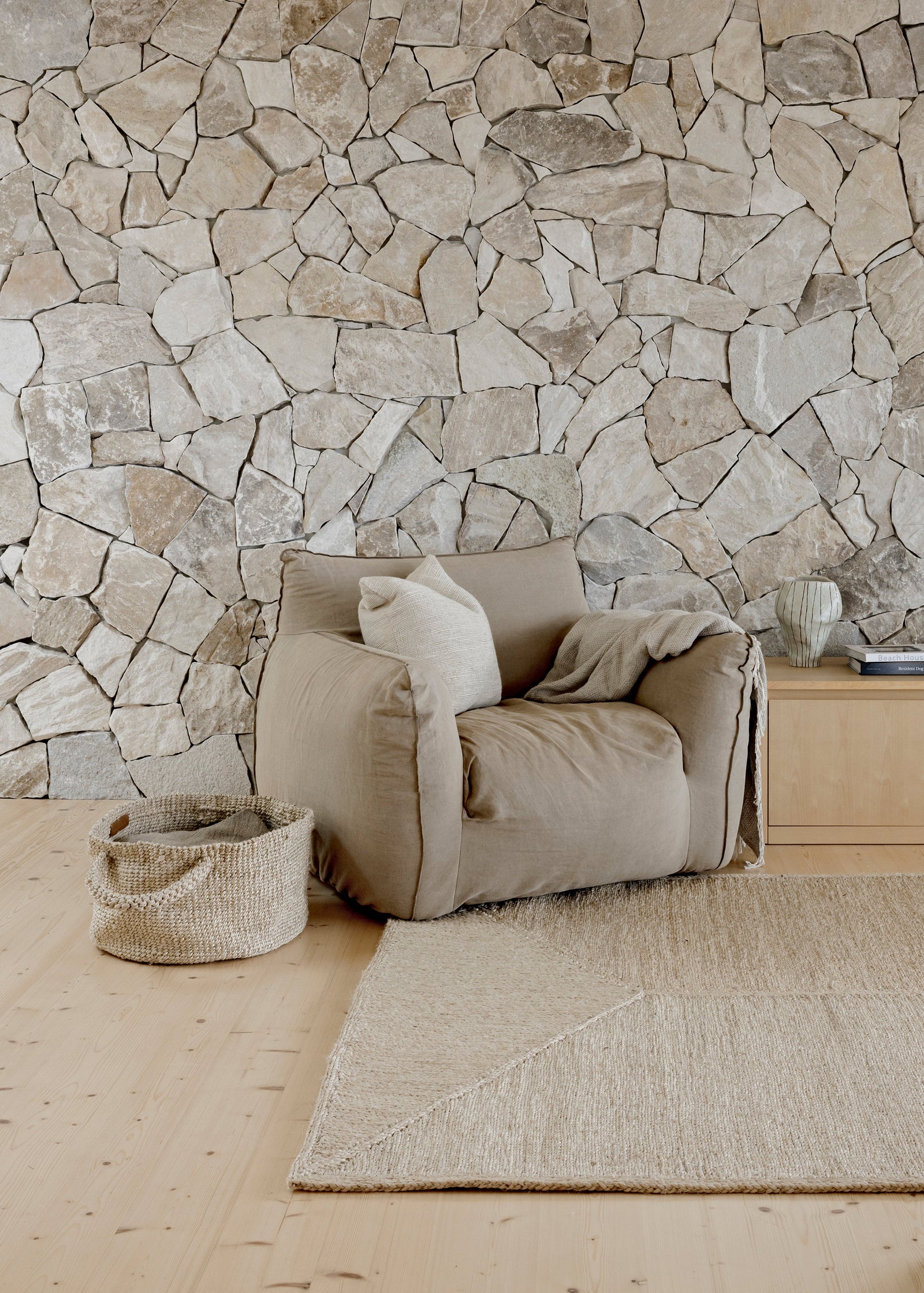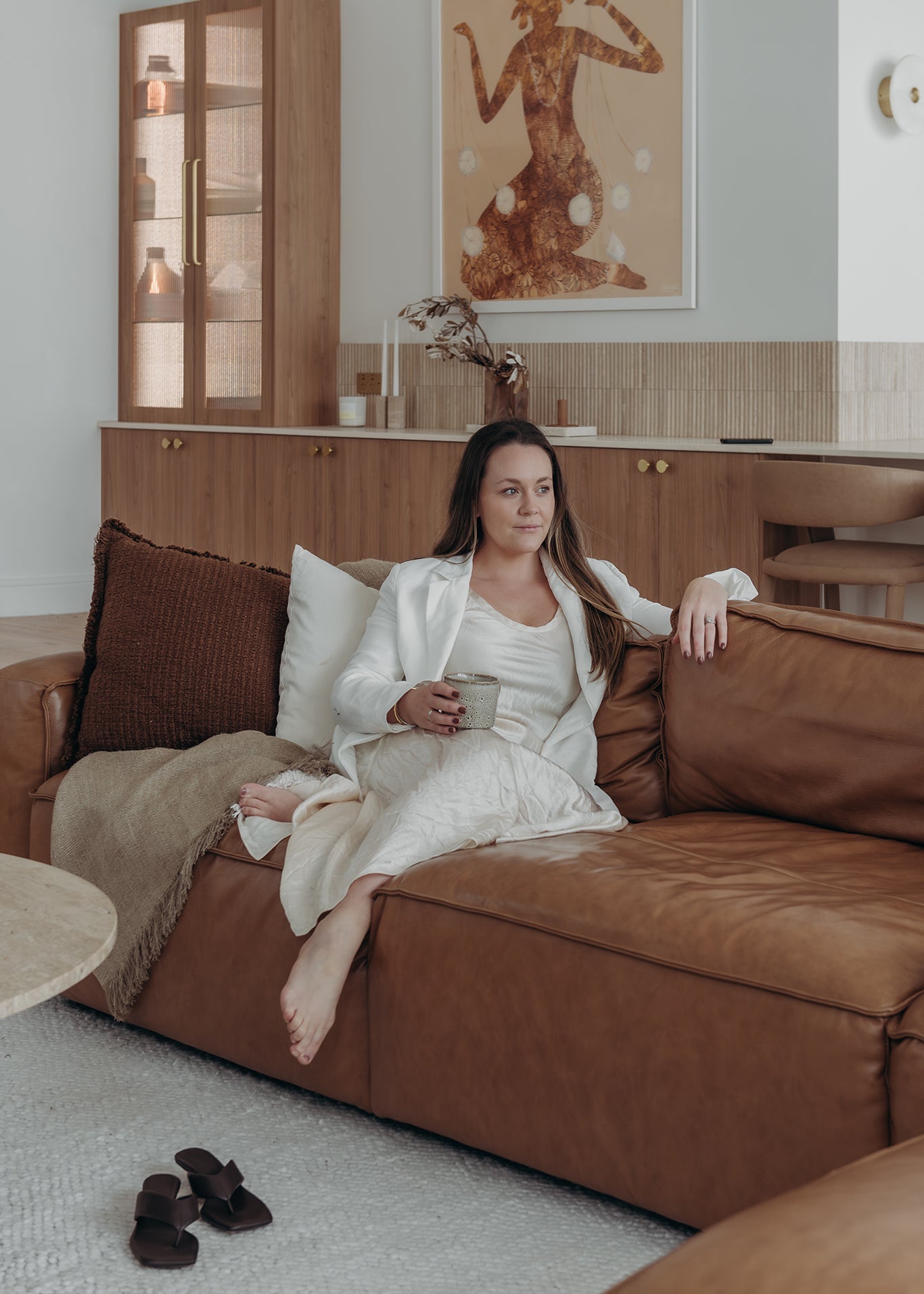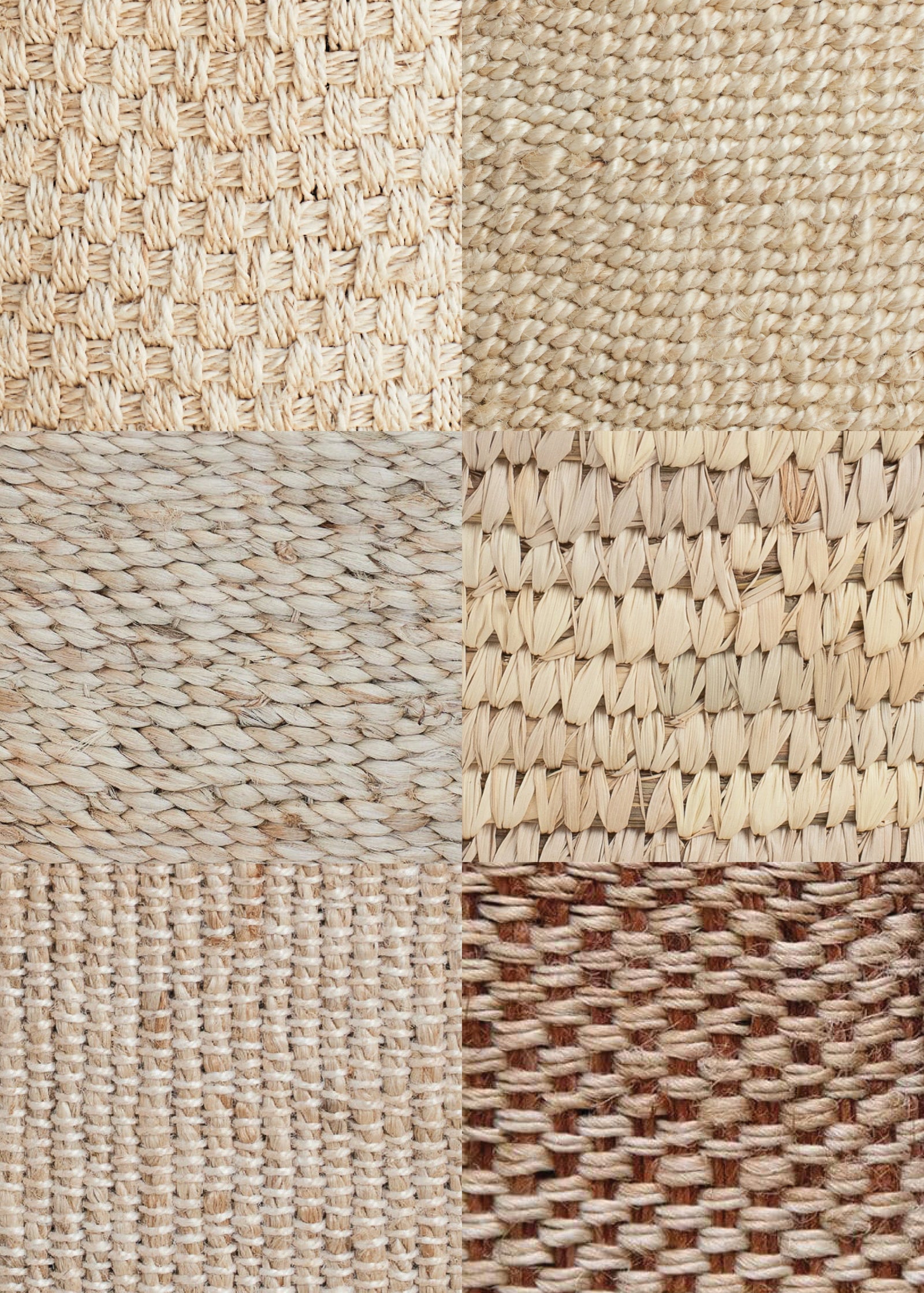Wall Art
Baskets
Rugs
TABLEWARE
Textiles
LIGHTING
DECORATIVE
BAGS
In Conversation with Natalie Walton of Imprint House

After a Sydney-based career working as an editor, interior stylist and writer, the past few years have seen Natalie Walton shift her focus somewhat to a slower pace of life in the country. In 2016 Natalie and her husband, Daniel, launched their unique online and pop-up shop Imprint House, offering timeless pieces in natural materials, simple styles and a neutral palette. Imprint House embodies Natalie’s reverence for a considered, nurturing home. As the place we gather, play, rest and rejuvenate before venturing out into the world, Natalie believes the way our home is put together is fundamentally important to our wellbeing - so much so that she’s just released an exquisite new book on the subject called This is Home: The Art of Simple Living published by Hardie Grant (more on this in the interview).
Natalie is also a mother of four little ones, which would no doubt serve to strengthen her lifestyle convictions; you can bet those Imprint House products would be thoroughly tried and tested in her home! Natalie’s ideal of living simply but well, achieved through the selection of natural, hard-wearing timeless pieces, resonates strongly with The Dharma Door, and we’re excited to share some of her story with you today.
Tell us about your business, IMPRINT HOUSE. When did it start and what values underpin its operation?
I launched Imprint House in 2016. In part it was an evolution of the blog Daily Imprint that I wrote for the best part of 10 years. I enjoy shining the light on the work of talented artists, artisans and designers. And it was also as a result of working as an interior stylist. Many of the items that I sell are the pieces that I would take along to homes that were often missing beautiful everyday essentials. They are also homewares that work in a range of spaces and are timeless. The third part of the puzzle was that we had recently moved from the city to the country, and I noticed that the items that we held onto during a big cull were the ones that favoured natural materials, simple styles and a neutral palette. At the time, it wasn’t easy to find all of these elements in the one store, and so I wanted to provide an emporium of beautiful everyday essentials.


Briefly describe your retail/studio space in its current iteration. To provide a broader context, could you also please tell us a little bit about Yarramalong?
Initially I opened Imprint House as an online store, primarily because I was finalising the website in the last weeks of my pregnancy of my fourth child. I look after the sourcing, and photo shoots, and my husband Daniel helps out behind the scenes with logistics and accounting. However, once we settled into life as a family of six, we decided to open up the shop by appointment, and for one-off events such as seasonal markets. These have been a lot of fun, and we have one coming up on 9 and 10 June to coincide with the Central Coast Harvest Festival. The idea is that people can come along to visit our markets, showcasing a range of wares, and then pop into one of the area’s many events, such as orange or pecan picking on the neighbouring farms.

You curate a wide range of beautiful products – how do you go about selecting your stock? Does it have to meet any particular standards?
First of all, it has to be something that I would want to have in my own home. But that doesn’t mean that it just has to have an aesthetic quality. We care deeply about our world (and the legacy we leave our children) and the environment in general. Living on a property we are all too aware of the effect that plastic and waste can have on the land - even yesterday I learnt that we can’t compost the current brand of teabags we buy as the leaves are not actually held together by paper but some synthetic material. This is so frustrating as a consumer who wants to live a simple life. And who now realises that this synthetic material is throughout our composted soil! We are not interested in “fast” products - ones that have little regard for people and process, and that are disposed of as quickly as they are made. Instead, it’s important that everything be something we will treasure for years to come. And that it will last too.
What are some of your key style influences and inspirations?
The everyday heroes who are trying to make small but meaningful change to their lives and the world in general. I was just reading about the photographer Marnie Hawson who has made the decision to only work with businesses who have an ethical and sustainable mindset, and focus on conscious consumerism and fair trade. This will have a ripple effect because, as Marnie says, her images spread the word far and wide for these brands. I really admire the thoughtfulness and conviction behind her decision.


How long have you stocked The Dharma Door products? What drew you to their products, and what items do you predominantly stock?
The Dharma Door was part of our launch collection. I am a huge fan of what Shannon has achieved with the business, creating beautiful products that empower women in developing nations. Her stories about the business have brought tears to my eyes, and I couldn’t think of a better brand to represent. I am honoured that we can play some part in helping improve the living conditions of others. We sell a range of the storage baskets.
What is your best-selling Dharma Door product? And why do you think that is?
The Large Storage Basket, which we use in our home as a laundry basket, is one of our best-sellers. It is a timeless piece that is beautiful and practical.

Working with publisher Hardie Grant, you have recently launched a beautiful new book, This is Home, that offers readers a practical and creative framework for how to approach home-making, divided into three parts: Create, Live and Nurture. How did you come up with your framework? Can you tell us a bit about the book development process?
The book started with an idea that evolved over a number of years. I have had the opportunity to visit many different homes while working as an interior stylist for a range of magazines - from architect-designed to more humble artist’s shed conversions - and while they all had their merits, some felt more like a home than others. I wondered why, and began the process of trying to deduce what it is that makes a place feel like a home. I delved deeply into the topic, and read about the history of the home, as well as topics that related to it by way of philosophy and psychology. And, of course, I interviewed many homeowners whose homes embody the values in the book. Last year I went on a three-week trip around the world with photographer Chris Warnes and we photographed 16 homes that appear in the book. On our return, I wrote the text, and in early February I received an advance copy, which was a surreal pinch-me moment. Now, it is available all around the world, and every morning I learn of a new country where someone has bought it, or has inquired to stock it. I am so thrilled with the response.
The book features a variety of considered homes from around the globe that you visited to gain personal insight regarding how it felt to be in these spaces. Of these, was there a home that you felt particularly taken with, or that you could imagine your own family living in?
It was important to me that I stepped inside every home, and met all of the homeowners in person. I didn’t want this to be a “pic search” book. And if I was going to write about creating authentic interiors, it was important that I could speak from a place of truth when describing the interiors. After visiting every home, a part of me wanted to live there. And the one that probably had the most pull was Italy, as I’ve always had something of a fantasy about living there as I learnt Italian for a number of years. However, one of the lessons I learnt while writing the book, is that we should focus on our needs when creating a home. And right now, with four young children, moving across the world is not our priority. Although maybe one day…

As well as authoring your new book, running your bricks & mortar pop-up store and online shop, and creating magazine/brand content with a variety of collaborators, you’re also a wife and mother to four children. And you’re slowly renovating your Yarramalong property. Tell us about this? How do you divide your time between the different roles and tasks? And what do you do for your own self-care?
Our lives are full. Again, another lesson that I learnt from the book was “less but better”. I am trying to apply this philosophy to my life at the moment. I have always been a “yes” person, and enthusiastic to take on as much as I can, because I get excited about opportunities and the possibilities of what something can become. However, I am transitioning to a new and exciting stage of my life. I am styling less for the magazines, and focusing more on my own business. We tinker away at the property, but mainly on the weekend, when the children run around freely. It’s a full life, but a good one.
Your Instagram account @theindigocrew provides some inspiring insight into your family life on your rural property. Tell us about your home. And what are some of your family’s favourite ways to spend time at home?
We are a family of six, and so are a happy and self-contained bubble. At this stage in our lives, the children don’t do any out of school activities. Our lives are busy enough, and they keep each other entertained. We always have some project on the go around the property - from something as simple as collecting kindling (last weekend) to making wreaths (next weekend) for our upcoming markets.
What are you looking forward to from a creative point of view? And also from a more general life point of view?
I have a few ideas percolating in my head for another book, and cannot wait to get started. We are also working with some local artisans to create some beautiful products for our shop. And in general, we look forward to growing some fruit trees, and living as simply and sustainably as possible.

To wrap things up, we’d love you to share:
A fav dinner or reliable go-to recipe?
I love simple yet wholesome food, and meals that bring us together as a family. Often on the weekend, I make pancakes which we eat with a variety of seasonal fruits. And I love to bake. It’s a fun and easy activity with the kids, and much faster than going to the shops. Plus, it tastes so much better. There are many recipes on theindigocrew.com.
Your most memorable holiday destination from the last 3 years?
About three years ago we went on a holiday to Italy and Finland. We stayed on an organic farm just outside of Verona, and it was that experience that was the catalyst for deciding to move out of the city onto a property in the countryside. I don’t think I’ll ever forget that holiday.
An album or song you've been listening to lately?
On a recent trip to Byron, towing our trusty caravan, Atlas, I put on Carole King’s Tapestry album. This was the music of my childhood, and I enjoyed it so much. I am also a huge fan of Bill Withers. I love music with heart and soul.

Main image by Chris Warnes; This Is Home images by Jacqui Turk; other images by Chris Warnes & Natalie Walton
Also in Journal
Notify me when available
We will send you a notification as soon as this product is available again.
We don't share your email with anybody












